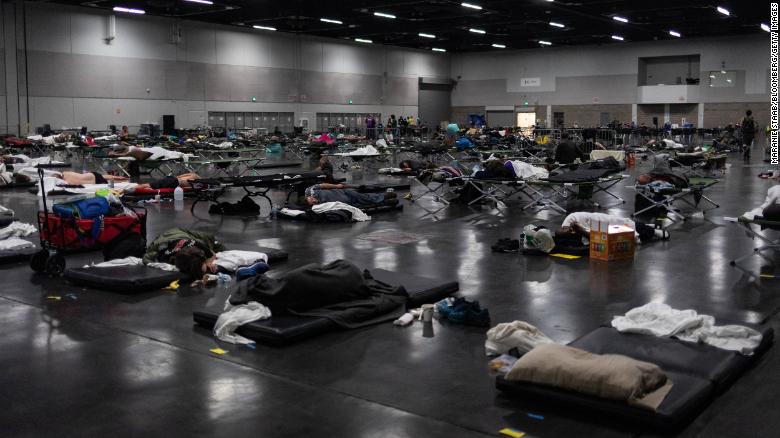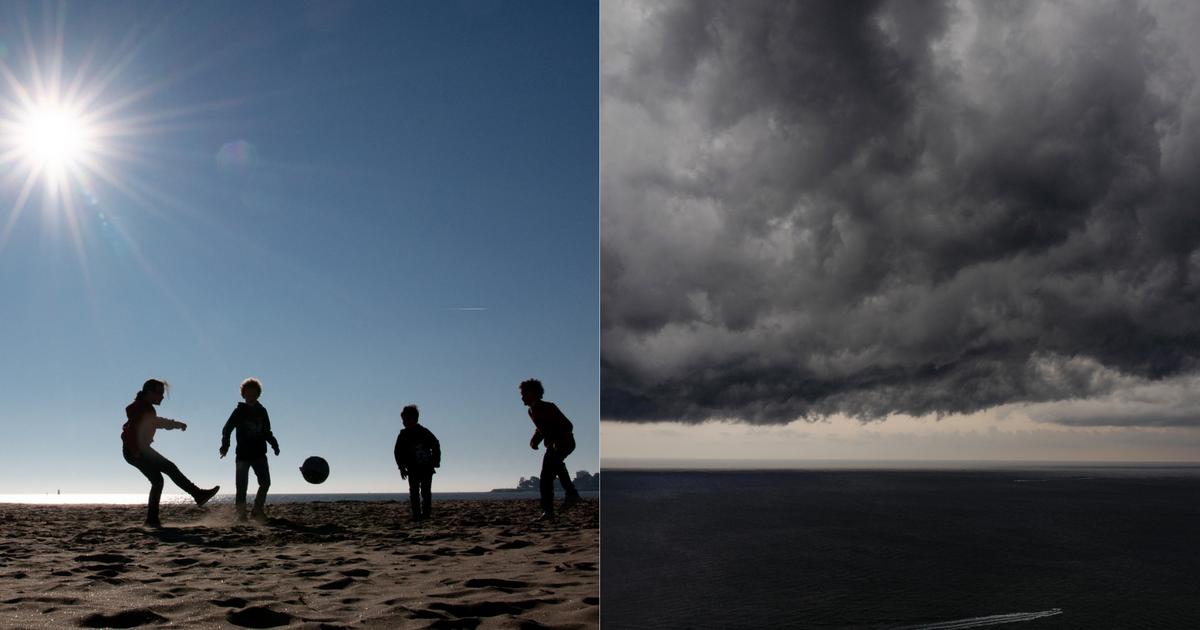The records that the heat wave breaks in the US and Canada 1:07
(CNN) -
When temperatures topped 100 degrees Fahrenheit (37.8 degrees Celsius), Bree Oswill gathered all the blankets and towels she could find and taped them to all the unshaded windows.
He does not have central air conditioning and he wanted to prevent sunlight and heat from entering his house.
Growing up in Portland, Oregon, Oswill has become more concerned with extreme weather changes from wildfires to heat waves that he is seeing year after year.
The 44-year-old mother of two compares it to a pandemic, but to no end.
"It's like a lockdown, but we won't solve it by putting on a mask or getting vaccinated," Oswill told CNN.
«It is something perpetual.
It's scary.
A historic heat wave is weighing down much of the Pacific Northwest and it's not yet July, a month when Oswill and many Portlanders typically experience the hottest days of the year.
Portland set an all-time high temperature record for three days in a row.
Seattle also beat its own record, set on Sunday.
Across the border, Lytton in British Columbia also broke all-time records on Sunday and Monday, recording temperatures that were 48 degrees Fahrenheit above normal.
advertising
Kristina Dahl, a climate scientist at the Union of Concerned Scientists, says the heat wave is "unprecedented."
Portland and Seattle exceed 37 degrees Celsius as the heat wave sweeps across the northwestern US.
"We saw heat records over the weekend and we beat them again the next day," Dahl told CNN, "especially in a part of the country where this kind of heat doesn't happen very often."
Michael E. Mann, a climate scientist at Pennsylvania State University, put it very simply: Climate change is making heat waves more frequent and intense.
"If you heat the planet, you will see a higher incidence of heat extremes," Mann told CNN.
Experts like Dahl and Mann say that climate change is reshaping the planet's weather patterns.
As humans emit more greenhouse gases into the atmosphere, warming the planet, more energy is added to the climate system.
Excess energy, according to Kristie Ebi, a climate and health researcher at the University of Washington, appears through extreme weather events.
"Heat waves have always happened and always will, but now we have a very different pattern of heat waves than we did a couple of decades ago," Ebi told CNN.
"And it is not only the intensity, it is also the geographical extent."
One-eighth of the US population suffocates under a record-breaking heat dome.
Climate change makes it worse
At the opposite end of the country, more than 40 million people in the Northeast are also under heat warnings, including the New York, Philadelphia and Boston metropolitan areas.
Although the heat will not be as strong as in Oregon and Washington state, records for the date could be set in the Northeast before temperatures cool down on Thursday.
Extreme heat is one of the deadliest consequences of climate change, killing more people than any other weather-related event.
Kate Weinberger, an environmental epidemiologist at the University of British Columbia, analyzed the number of deaths related to extreme heat in the US each year.
A 2020 study, in which Weinberger was the lead author, found an underestimated number of heat-related deaths in the country, as registries generally only consider medical terms like heat stroke and neglect other potentially heat-related causes of death. , like heart attacks.
"Heat is likely to contribute to many more deaths from causes other than heat stroke, because heat can exacerbate other chronic diseases, such as heart and lung conditions," Weinberger told CNN.
"Given the danger posed by heat, events like the ongoing heat wave in the Pacific Northwest should be taken very seriously."
ANALYSIS |
Fix the climate crisis or get out of the way
Officials from Multnomah County, in Portland, told CNN that there were at least 43 heat-related emergency department and urgent care clinic visits Monday morning in the county on Friday, Saturday and Sunday.
The Sheriff's Office said Monday that "ambulances are running out due to demand."
"We would normally expect about 1 or 2 visits for heat illness in the same time frame," Kate Yeiser, Multnomah County Communications Coordinator, told CNN in an email.
"Visits this weekend account for nearly half of the heat illness visits that we typically see for an entire summer."
An unfortunate aspect of heat-related deaths in the US is the number of premature deaths caused by exposure to heat, particularly among infants and children left unattended in cars.
A 2020 study published in the journal GeoHealth, of which Ebi was a co-author, found large increases in the number of premature deaths in the US each year due to heat exposure as the planet warms.
"Many don't understand how fast cars heat up and how babies' physiology can't tolerate that," Ebi said.
"It is important to make sure that people are really aware of the protection of babies and children during these heat waves."
To understand how the climate crisis is changing the playing field, Mann suggests thinking about climate events on a bell curve.
The highest point on the curve is where the most common weather occurs and the tails are where extreme events are found.
A warming planet shifts the curve of the bell to the right, pushing already extreme events into uncharted territory.
US wildfires could be exacerbated by climate change, study finds
Mann says that climate models, which predict general global conditions in the future, can capture change well and predict increases in extreme heat.
But, he said, they don't show a complete picture of the impacts of climate change during the summer.
"This is an area where current-generation models don't capture a real-world climate connection," said Mann, who was also the lead author of a study showing that climate change is causing the summer jet stream - fast-flowing air currents in the upper atmosphere, which influence day-to-day weather - behave strangely.
"In that sense, climate models are actually underestimating the impact that climate change is having on events like the unprecedented heat wave that we are witnessing in the west right now," added Mann.
Climate change can cause the jet stream to lock into a static wave pattern during the summer.
Daniel Swain, a climate researcher at the University of California, Los Angeles, says this is best illustrated by moving a jump rope up and down until the waves appear to stop.
Similarly, in the atmosphere, high- and low-pressure systems can get stuck, creating extreme weather events such as intense heat, droughts, or wildfires.
People take shelter in a cooling facility in Portland on Monday.
That's what happened in the Pacific Northwest this weekend, where a so-called heat dome, a strong high-pressure ridge, acts like a cap on the atmosphere.
The lid traps the hot air trying to escape and heats it even more as it sinks.
The European Union approves a climate change law with the goal of reaching zero emissions by 2050
"Even if the jet stream does what it used to do historically, without specific contributions to climate change, climate change continues to dramatically increase the likelihood of these extreme heat events," Swain told CNN.
"If you heat the atmosphere, you would expect those heat waves to be hotter than they would have been otherwise."
If the US fails to reduce global warming emissions and improve climate adaptation systems, climate experts say people in the US and around the world will experience more severe impacts from heat. extreme.
By the middle of this century, 2036 to 2065, vast swaths of the United States that do not normally experience extreme heat, such as the Upper Midwest and New England, will face severe heat on a regular basis, according to a study by the Union of Concerned Scientists of which Dahl was a co-author.
"When we look at where we are going in the future, our analysis has shown that if we fail to reduce our heat-trapping emissions, we are prepared to see a staggering expansion of dangerous heat in the US," Dahl told CNN.
But, he adds, if the US aggressively cuts emissions and limits future global warming to 2 degrees Celsius, we can "save millions of people in the US and many more around the world from the relentless summer heat." .
Camila Bernal contributed to this report from Portland.
Heat wave














